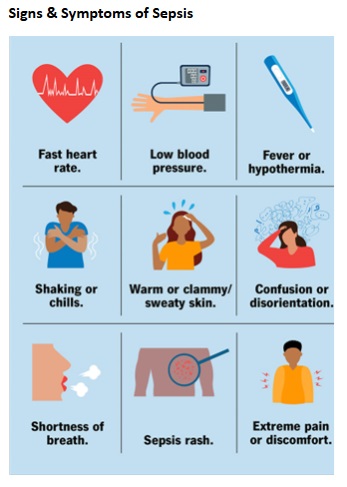Latest News from Everycare
What is Sepsis?
 Sepsis is a life-threatening medical emergency caused by the body’s overwhelming response to an infection. Sepsis develops when an existing infection triggers an extreme immune system response in the body. The body responds by releasing proteins and other chemicals to fight it. Sepsis occurs when this response gets out of control, triggering extensive inflammation. Severe sepsis can lead to septic shock, a medical emergency and without urgent treatment, it can be fatal.
Sepsis is a life-threatening medical emergency caused by the body’s overwhelming response to an infection. Sepsis develops when an existing infection triggers an extreme immune system response in the body. The body responds by releasing proteins and other chemicals to fight it. Sepsis occurs when this response gets out of control, triggering extensive inflammation. Severe sepsis can lead to septic shock, a medical emergency and without urgent treatment, it can be fatal.
Stages of Sepsis
There are 3 stages of Sepsis – see flow chart opposite:
Sepsis Symptoms
It’s possible to mistake the symptoms above for those of another condition, like?pneumonia, COVID-19, or cancer.
In addition, sepsis symptoms can be particularly hard to identify in infants, children, and people with:
It’s best to seek medical assistance right away if you suspect sepsis. A health professional can examine you or the person you care for to make a diagnosis.
 Who does sepsis affect?
Who does sepsis affect?
Sepsis can affect anyone, but people with any kind of infection, especially bacteraemia, are at a particularly high risk.
Other people who are at a high risk include:
- People older than 65 years old,?new borns?and infants, and pregnant people.
- People with medical conditions such as?diabetes,?obesity,?cancer?and?kidney disease.
- People with weakened immune systems.
- People who are in the hospital for other medical reasons.
- People with severe injuries, such as large?burns?or wounds
- People with weaker immune systems, including people with?HIV?or those undergoing chemotherapy treatment for cancer
- People in intensive care units (ICUs)
- People exposed to invasive devices, like intravenous catheters or breathing tubes
Treatment for sepsis
Sepsis needs treatment in hospital straight away because it can get worse quickly.
You should get antibiotics within 1 hour of arriving at hospital.
If sepsis is not treated early, it can turn into septic shock and cause your organs to fail. This is life threatening.
You may need other tests or treatments depending on your symptoms, including:
- treatment in an intensive care unit
- a machine to help you breathe (ventilator)
- surgery to remove areas of infection
- You may need to stay in hospital for several weeks.
Recovering from sepsis
Most people make a full recovery from sepsis. But it can take time.
You might continue to have physical and emotional symptoms. These can last for months, or even years, after you had sepsis.
These long-term effects are sometimes called post-sepsis syndrome, and can include:
- feeling very tired and weak, and difficulty sleeping
- changes in your mood, or anxiety or depression
- post-traumatic stress disorder (PTSD)
DO.
- ask your work about changes to your working hours or conditions while you’re recovering
- do some gentle easy exercises to build your strength (see https://www.nhs.uk/live-well/exercise/strength-exercises/)
- get regular rest and sleep
- try to prevent infections – for example, by washing your hands regularly
- try to eat little and often if you have a small appetite
DON’T
- do not try to rush your recovery – give yourself time
Personal Independence Payment, also known as PIP, is a benefit available to people who have a long-term health condition or disability. It is intended to help cover the extra costs that people can face due to the impact of their condition.
There are two components to PIP:
- Daily Living component
- Mobility component
If you are eligible for PIP, how much you receive will be based on which component is most relevant to you and your needs.
The Daily Living component is aimed at people who require additional assistance in everyday life such as with eating and drinking, washing and other personal tasks, communicating with others or handling money, for example.
The Mobility component is based on providing assistance to those who find it difficult to get out and about due to their condition. This could be because they need physical help when outside of their home or require assistance with planning a trip, for example.
To find out more and to find out the rates for 2024 – click here
Leading dementia organisations have joined forces to publish a new Dementia manifesto ahead of the General Election on 4th July. This collaboration from Alzheimer Scotland, Alzheimer’s Research UK, Alzheimer’s Society, Dementia UK and the UK Dementia Research Institute calls on the next Government to take action for the one in two of us who will be directly affected by dementia in our lifetime.
The full manifesto can be read and downloaded at https://www.dementiauk.org/dementia-coalition/?misc=media
Dementia is the leading cause of death in the UK and is set to become the defining health and social care challenge of our time. However, despite what many believe, dementia is not an inevitable part of ageing.
There are currently 982,000 people living with dementia in the UK, yet hundreds of thousands of people do not have a formal diagnosis, remaining in the dark about their condition and locked out of care, support and the treatment opportunities that research brings.
For those who have a diagnosis, there is no cure – the care and treatment options that exist are often disjointed, inaccessible and inadequate, for both those with the condition and for their families and carers.
Living with dementia can be exhausting and overwhelming, but it doesn’t have to be this way. The manifesto draws on expertise from the range of organisations involved to demand a sustained, strategic approach to research funding, clear diagnosis targets and pathways and access to treatments and specialist care for people living with the condition:
- Prevention – including recommendations for a cross-governmental ‘Brain Health’ National Prevention Strategy to address the health and lifestyle factors that affect our risk of developing dementia
- Diagnosis – setting out the need for ambitious national diagnostic targets, a pilot of brain health clinics to deliver equitable high-quality services and the importance of investing to integrate promising research into accurate and deliverable diagnostic tools
- Support – calling for improved dementia support in primary care settings and extending the national dementia diagnosis targets to include young onset dementia, where symptoms develop under the age of 65
- Care – including a sustainable funding model for quality personalised care and an immediate review of the NHS continued healthcare funding application process to recognise the needs of people living with dementia
- Research – setting out the need to increase real-term spending on dementia research to accelerate new treatments, publish a long-term strategic approach to dementia research and promote and embed dementia research across the UK
To read the full story – click here 
Research conducted by Eurocare has examined unpaid care provided by people of all ages across Europe. It was carried out by University College London and St George’s, University of London, with support from UK charity Carers Trust and research teams in Spain, Norway and Germany.
It showed around one in 10 people aged 15 to 29 across Europe are carers. More than a quarter (27%) of these young adult carers come from households ranked in the bottom fifth for income.
Their mental health also deteriorates after becoming a carer and the impact increases the more hours they spend caring, showing the urgent need for early identification and intervention to support them. Young adults who are providing more than 20 hours of unpaid care per week are more than 96% more likely to report poor mental health compared to their peers.
Young adult carers’ education and future employment are also affected and, in the UK, there are stark inequalities in educational attainment. Young adult carers are 38% less likely than their peers to hold a university degree as their highest qualification. This rises to a staggering 86% for those who provide more than 35 hours of care per week.
To read more on this story – click here
 Sepsis is a life-threatening medical emergency caused by the body’s overwhelming response to an infection. Sepsis develops when an existing infection triggers an extreme immune system response in the body. The body responds by releasing proteins and other chemicals to fight it. Sepsis occurs when this response gets out of control, triggering extensive inflammation. Severe sepsis can lead to septic shock, a medical emergency and without urgent treatment, it can be fatal.
Sepsis is a life-threatening medical emergency caused by the body’s overwhelming response to an infection. Sepsis develops when an existing infection triggers an extreme immune system response in the body. The body responds by releasing proteins and other chemicals to fight it. Sepsis occurs when this response gets out of control, triggering extensive inflammation. Severe sepsis can lead to septic shock, a medical emergency and without urgent treatment, it can be fatal.




